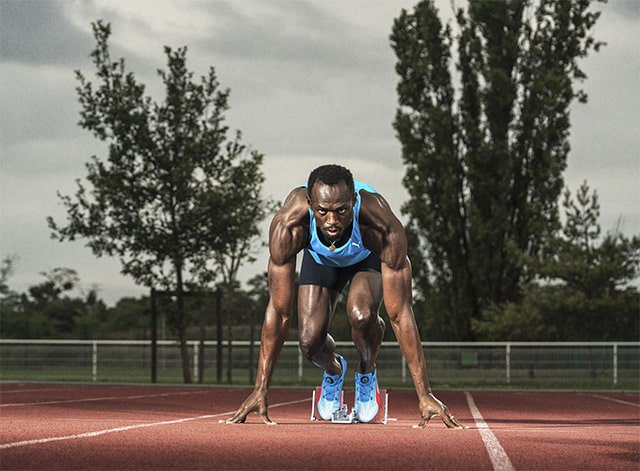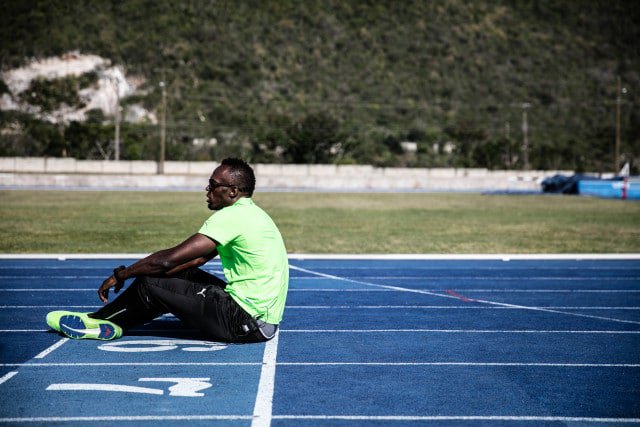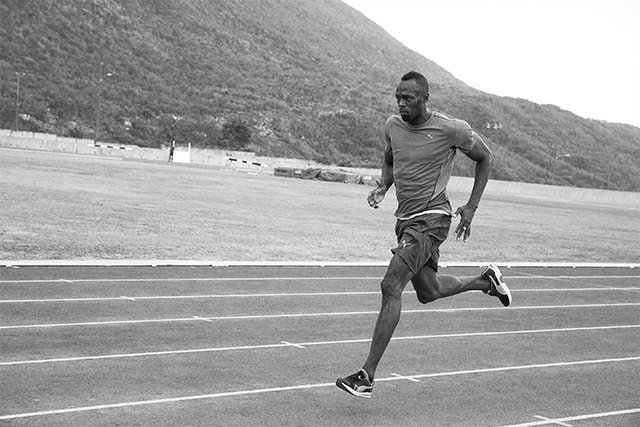Son Of The Sprint Factory: An Interview with Bolt
For many years, the fastest man in the world has kept the media at arm’s length.
For many years, the fastest man in the world has kept the media at arm’s length. But just before – what could be – his last Olympics in Rio, a handful of journalists were afforded exclusive access to Usain Bolt’s own back yard, his hometown of Kingston, Jamaica. Runner’s World gear editor Ryan Scott was among the lucky few. – By Ryan Scott.

Name: Usain St Leo Bolt
Age: 29
Occupation: 100- and 200-metre world-record holder
The idea Usain Bolt almost didn’t put the 100-metre race in his sights now seems ludicrous. But there was a time when the fastest man ever to participate in the holy grail of track and field struggled to convince his coach that the distance would be suited to him.
“I had competed in the 200 metres and was about to begin training for the 400. But at a track meeting in New York, I told my coach I wanted to attempt the 100. While he didn’t agree it was the right move, he did give me one chance. He told me I could run the race, and if I didn’t win we would draw a line underneath it – I won.”
Fast forward a decade and Bolt has won back-to-back Olympic Golds in the 100 and 200 metres, both in 2008 and 2012 (also known as the ‘double double’); but despite his fame, he chooses to live and train in the grungy, dangerous city of Kingston, where violence and drug problems are very real, and a far cry from the lush American resorts elsewhere on the island. The conditions he trains in are unostentatious; on a simple, blue track that isn’t surrounded by a grand stadium, and in an honest, rugged gym.

Together with his legendary coach Glen Mills, Bolt has consistently come out on top, despite the fact cynics have been quick to write him off when he has suffered an injury or shied away from public appearances, and the fading faith in sport that permeates the media today.
In Bolt’s arsenal going into the Rio Olympics is his – unexpected – 100-metre win at the 2015 World Champs held in Beijing. He has dipped under 10 seconds twice in the last two months – his fastest time, 9.88, was the second fastest this year.
Bolt is injury-free and hungry to be unleashed in the Amazon jungle, to claim his third Olympic Gold in both the 100 and 200 metres. We spoke to Bolt about his appreciation of ‘The Sprint Factory’ – as Jamaica has become affectionately known, because it’s where some of the world’s fastest runners hail from – and whom he predicts will carry on his super-fast legacy, after he has competed in his final Olympics.

RW: You’ve had such a long career, at the top of your game, and yet running still excites you.
US: I still look forwards to competing, pushing myself, and being in the stadium among all those people.
You recently posted a picture of the medals you won at the Jamaican Boys and Girls Championships (Champs) on Twitter. What do they mean to you?
They’re a reminder of how my past relates to my present, in terms of where I’ve come from and what I’ve accomplished in my life. I’m pretty happy with myself!
Why are Jamaicans such great sprinters?
Sprinting culture is adopted at a grass-roots level, which is why Jamaica produces such dominant athletes. As though they are training for the Olympics, kids are actively encouraged by their coaches to try to win, and to leave their own legacy; which fosters intense competition and rivalry from a young age. Watch these kids – who come from every corner of our island – run at the Champs, and you’ll see how hard they’ve worked. Their times are unbelievable.
Did you ever win at Champs?
Yes, of course [laughs]. I still hold the 400-metre record, actually. Whoever breaks my record is the guy you should keep an eye on.

Do any of the youngsters at Champs remind you of yourself?
One athlete stood out: Michael O’Hara runs in a similar style to which I used to run, with powerful strides and smooth running. If he continues to work hard, and listen to coach Glen Mills, he’ll become one of the best in the world.
It would appear your sponsor, Puma, has launched a worldwide search for the next Bolt. Are you involved in this?
Hopefully I’ve inspired it. The fact that Puma found me when I was really young shows they have vision and are committed. An athlete needs assistance right from the beginning, to ensure they get the right nutrition, gear and guidance. Puma has also backed a programme that ensures kids get there sensibly, without being run into the ground. It’s important kids are given time to grow into the sport.
I remember feeling nervous about running when I was young. But the energy of the stadium is going to either make you feel nervous or excited, the latter of which has to be learned. I decided I was going to be the best at what I do. These days, I love performing and entertaining the crowd at big championships.
Drugs in sport has been topical in the news lately: the Russians are out of Rio, and new measures are being taken. Are you confident athletics is being cleaned up?
The IAAF is doing their best to try and clean up sport, though it’s pretty sad that every time we go forwards we seem to take one step back. In my opinion, it’s better we find them (drug users) than to allow them to get away with it; but personally, I try to stay away from scandals, in favour of making a conscious effort to push sport forwards in a positive way.
As a youngster, you also pursued cricket and soccer. What made you eventually choose a career in athletics?
I’ve always loved cricket, and my dad is a massive fan of the sport. It was actually my cricket coach who introduced me to track and field; but I got to a point where I had to choose one or the other. My Dad advised me to go for track, because then I would only have to be responsible for my own hard work, and I would avoid the politics involved in team sports. I think that was good advice.

Are you going to retire after Rio, and how do you want to be remembered?
I never said I would retire. As my coach says, we’ll take it one year at a time, see how my body feels, and whether I have the motivation to wake up in the morning and go to training. We’ll make a decision from there. How do I want to be remembered? As one of the greatest ever to compete in athletics: a motivator, a good person, and a fun person to hang out with.
You’ve been on top for a long time and everybody is chasing you. Was there ever a time when you were the one doing the chasing?
At the start of my career, I struggled with motivation. I wanted to be the best, but I wasn’t working hard enough to achieve it. As a consequence, I was initially chasing Tyson Gay. In 2007, I decided, you know what, I really want to be the best that I can be. At the Champs, I ran my heart out; but still I only came second. I asked my coach why, and he told me it was because I hadn’t worked hard enough in training. From that point onwards, everything changed.
The following day, I (Ryan) went to the Champs that Bolt had spoken so highly of, and it was truly something special to behold: 30 000 Jamaicans, of all ages, wildly cheering on youngsters aged between 14 and 18 years old. The energy, pride and unabated involvement in the process was more intense and visceral than I’d ever imagined it would be.
I understood why Bolt had grinned mischievously when he’d spoken about the Champs, because he knew that words would never really explain it. It has evolved organically, and cannot be replicated by bigger nations with bags full of cash and plans for world domination.
The hot summer swelter of the Caribbean creates a bubbling cauldron of muscle, sweat, steadfast stares and bravado, waiting to explode out of the stadium, and onto the world stage of track and field.
That’s how The Jamaican Sprint Factory feeds its own legacy.
READ MORE ON: inspiring people motivation puma usain-bolt



